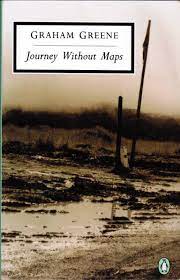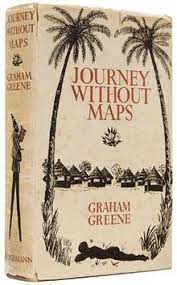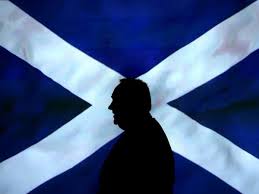
© Penguin
I’m a big fan of Graham Greene. Indeed, Journey Without Maps (1936), a non-fictional account of four weeks he spent trekking through the as-yet unmapped interior of Liberia in 1935, is by my calculations the 18th book by him that I’ve read. However, while I hold much of Greene’s writing in high esteem, I never got the impression that he was a person in whose company I’d have wanted to spend time.
His autobiography A Sort of Life (1971) suggested he was a rather cold, self-absorbed creature who saw his emotional detachment as a useful tool for his writing. For example, he described how as a young man he’d been in hospital with appendicitis when a child died in another bed in the ward. He paid careful attention to what followed with the child’s family: “There is a splinter of ice in the heart of a writer. I watched and listened. There was something which one day I might need: the woman speaking, uttering the banalities she must have remembered from some woman’s magazine, a genuine grief that could communicate only in clichés.”
No, I always suspected I’d feel more comfortable hanging out with Greene’s troubled and flawed, but more human-seeming protagonists, like Querry from 1960’s A Burnt-Out Case, or Plarr from 1973’s The Honorary Consul, rather than with the aloof, dry, retiring man who’d created them.
Journey Without Maps begins with Greene as one of half-a-dozen passengers on board a cargo ship sailing from Liverpool to Freetown in Sierra Leone. En route, the ship stops in Tenerife, where Greene observes sourly that a ‘cheap, banal’ film adapted from one of his novels, 1932’s Stamboul Train, is currently playing in a cinema. Then time is spent in Freetown, where Greene recruits the main personnel for his Liberian trek: Amedoo, whom he describes in English-boarding-school / British-Empire argot as ‘my head boy’, Laminah, ‘the second boy’, and an elderly Muslim cook called Souri. Greene writes of them: “Our relationship was to be almost as intimate as a love-affair; they were to suffer from the same worn nerves; to be irritated by the same delays…” Yet he qualifies that with a melancholy reflection: “…but our life together, because it had been more perfectly rounded, seemed afterwards less real… I had nothing left but a few photographs to show that I had ever known these three men…”
Greene gives his dealings with Amedoo, Laminah and Souri considerably more attention than his relationship with another key member of the expedition – his cousin Barbara Greene, who accompanied him the whole way through Liberia and recorded her own memories of the experience in a book called Land Benighted, published in 1938. Throughout Journey Without Maps, Greene refers to her only as ‘my cousin’ and, indeed, she’s kept so much in the background that for stretches of the book you forget her existence.
The Greenes bring the following on their trek: “…six boxes of food, …two beds and chairs and mosquito nets, three suitcases, a tent we were never to use, two boxes of miscellaneous things, a bath, a bundle of blankets, a folding table, a money-box, a hammock.” This necessitates the hiring of 25 local men to carry it and Greene admits, “I couldn’t help being a little shamed by my servants, who each brought with them a small flat suitcase.” Although these ‘carriers’ are being paid what Europeans would consider a pittance, Greene frets about the cost of their wages as it dawns on him that the sum of money he’s brought along will struggle to meet the expedition’s expenses.
But his main worry, at least earlier in the book, is about sticking to the schedules he sets. For example: “I was concerned only at the moment with time, with the need to get to Bolahun before dark. It was an unpractised traveller’s anxiety; it led to unnecessary strain and my carriers’ mistrust. Later I got used to not giving a damn, just to walking and staying put when I had walked far enough, at some village of which I didn’t know the name, to letting myself drift with Africa.”
So off they go, crossing from Sierra Leone into Liberia, heading towards the coast in Liberia’s Grand Bassa district, and passing through part of French Guinea along the way. Much of the territory they traverse simply didn’t exist on maps at the time. In Greene’s words, the only way to get anywhere was “to know the next town or village ahead and repeat it as you go…” As a result, he alters his plans continually “until my small book was filled with lists of probably mis-spelt names in smudged pencil of places I never succeeded in finding.”
The days are spent labouring from one remote village to the next, the villages ranging from ones that are in reasonable trim to ones that are pestilent, tumbledown hellholes, their inhabitants “old and diseased, withered, goitered, with venereal sores.” The nights are frequently spent in decrepit huts where the constant presence of rats and mosquitoes deprive Greene and his cousin of much of their sleep. This book could easily have been retitled Journey Without Naps. Greene gets severely sick but soldiers on. It’s no surprise that after they cease their journey each evening, he partakes heavily of whisky.

© Heinemann / From en.wikipedia.org
It doesn’t even sound like there’s much pleasure to be had from the scenery they pass during the daytime. “The word ‘forest’ to me had always conveyed a sense of wildness and beauty, of an active natural force, but this forest was simply a green wilderness, and not even so very green. We passed on twelve-inch paths through an endless back garden of tangled weed; they didn’t seem to be growing round us so much as dying; there was no view, no change of scene, nothing to distract the eyes, and even if there had been, we couldn’t have enjoyed the sight, for the eyes had to be kept on the ground all the way, to avoid the roots and boulders.”
Among the people they encounter are sporadic westerners, like commissioners, engineers, gold prospectors and missionaries, but obviously the majority of their encounters are with Africans. The most prominent of these are suspicious officials and customs men, and the chiefs of the villages where they stay. The chiefs are usually generous in their hospitality and sometime organise performances by masked ‘devils’, “in a head-dress of feathers, a heavy blanket robe, and long raffia mane and raffia skirts.” These devils dance for them and speak a language that is ‘fluent and quite unintelligible’ and requires an interpreter to translate it, even for the benefit of the locals.
Just before reading Greene’s book, I’d coincidentally read Africa’s Tarnished Name (2018), a collection of essays by the Nigerian writer Chinua Achebe. The title essay has some strong things to say about Joseph Conrad and his landmark, Congo-set novella Heart of Darkness (1899), which Greene predictably refers to during Journey Without Maps. Achebe complains that Heart of Darkness is set in “an Africa where nothing good happens or ever happened, an Africa that has not been discovered yet and is waiting for the first European visitor to explore it and explain it and straighten it up or, more likely, perish in the attempt.” He accuses Conrad of devising “a simple hierarchal order of souls for the characters in Heart of Darkness. At the bottom are the Africans, whom he calls ‘rudimentary souls’. Above them are the defective Europeans, obsessed with ivory, petty, vicious, morally obtuse; he calls them ‘tainted souls’ or ‘small souls’. At the top are regular Europeans, and their souls don’t seem to have the need for an adjective.”
With Achebe’s criticisms fresh in my mind, I wondered when I started Journeys Without Maps if Greene would interpret his experiences using Conrad’s racial hierarchy, with enlightened, decent Europeans at the top and ‘rudimentary’ Africans at the bottom. Thankfully, he doesn’t do this. While he dwells a lot on the hardships and squalor he sees in the Liberian hinterland, he tempers it with references to Western hypocrisy, demanding, for example, “why should we pretend to talk in terms of the world when we mean only Europe or the white races? Neither ILP (International Labour Party) nor Communist Party urges a strike in England because the platelayers in Sierra Leone are paid sixpence a day without their food.” He also sees unique positive qualities in the Africans, saying at one point that he “had not come across a single example of dishonesty from the boys, from the carriers, from the natives in the interior: only gentleness, kindness, an honesty which one would not have found, or at least dared to assume was there, in Europe. It astonished me that I was able to travel through an unpoliced country with twenty-five men who knew that my money-box contained what was to them a fortune in silver.”
Elsewhere, where things fail to impress him, he at least offers some balance. The locals display an irrational fear of the dancing devils (obviously men in masks and costumes), but Greene likens those devils to the similarly feared masters at English boarding schools. While the curious villagers, unused to the sight of white of people, crowd around him and his cousin, he compares their curiosity favourably with how Europeans react to the unusual and unknown: “We were as good as a circus; they had no wish to stuff us or skin us or put us in cages.” He mocks the caricatured Little England society that British colonists have established in Freetown and laments the efforts of some aspirational local Creoles to imitate it. Mind you, a remark he makes likening the Creoles’ attempts at ‘playing the white man’ to a ‘chimpanzee’s tea party’ leaves a bad taste in the mouth.
Frequently, Greene seems utterly miserable in Liberia: “I could have cried with exhaustion and anger and want of sleep.” At other times, admittedly less frequent, he experiences a joyous epiphany: “I remember wandering round the village listening to the music among the little glowing fires and thinking that, after all, the whole journey was worthwhile: it did reawaken a kind of hope in human nature.” Those highs and lows will be familiar to anyone who’s done some serious travelling and savoured the good aspects and suffered the bad aspects of it. Also, Greene’s well-documented bipolar disorder probably contributed to his mood-swings. Still, I was a bit shocked by his account of the trek’s end, when they finally reach the coast. This has Greene parting from his faithful carriers in two curt, unsentimental paragraphs: “They drifted away out of the courtyard one by one, with nothing to do, conscious of their native clothes among the trousered Bassa. They didn’t take the warning to get clear away out of town with their money, for that night I lay in bed listening to the drunken singing and shouts… under my wall.”
I can’t help but take away from Journey Without Maps an impression of Greene as an instinctive misanthrope. He’s someone who attempts to be fair and do the right thing but who harbours, deep down, a distrust of, a snarkiness towards, the structures and systems of humanity, whatever continent they’ve evolved on. Which doesn’t get in the way of him being a great writer, but probably made him something of a pain in the arse to travel with.

From en.wikipedia.org











